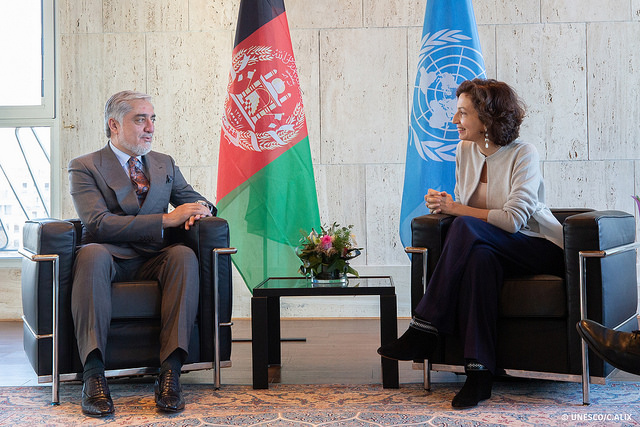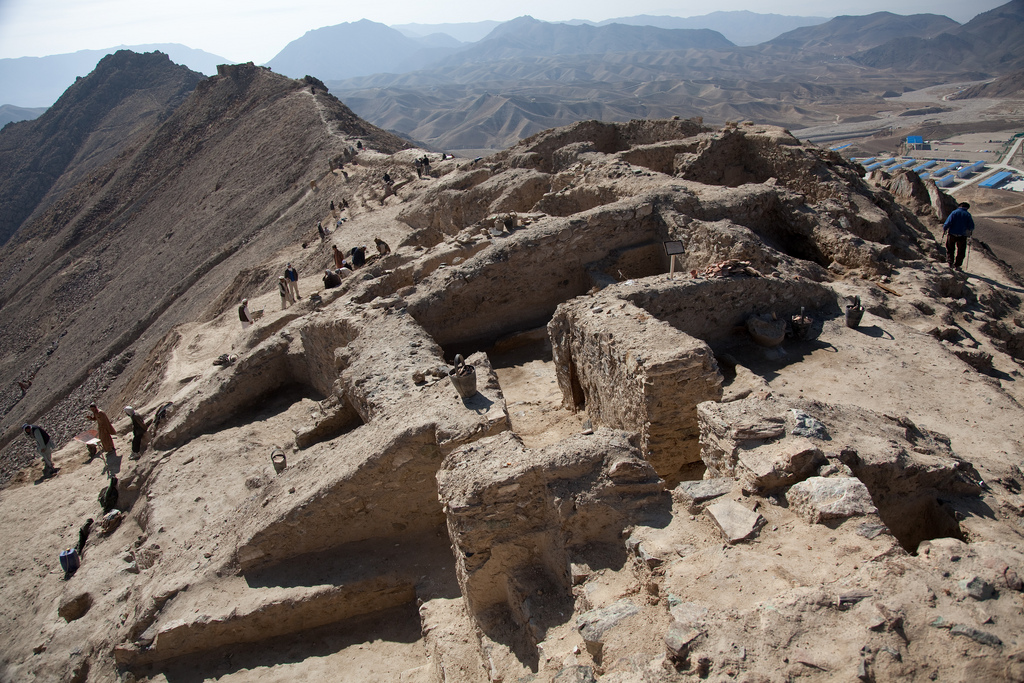Since it was re-opened in 2002, the UNESCO Office in Kabul has been working with the government of Afghanistan and a variety of local and international partners and stakeholders to build Afghanistan’s capacity in the areas of education,culture, communication and information, and natural and social sciences. In pursuit of this goal, the Office oversees a broad range of programs and events across these focus areas, all designed to enrich thelives of Afghan citizens and contribute to a stronger future for their country.
Some of the most recent offerings from the UNESCO Office in Kabul include the following:
Workshop on Intangible Cultural Heritage
Cultural heritage involves more than monuments and collections of objects. It also includes traditions and living expressions (e.g., oral traditions, rituals,social practices, festive events, and performing arts, as well as the knowledge and skills involved in the production of traditional crafts) that cultural groups have passed down to their descendants for generations. UNESCO refers to this body of traditions as “intangible cultural heritage” (ICH), and the question of how to safeguard these practices is of growing concern in the face of globalization.

In October 2018, UNESCO and Afghanistan’s Ministry of Information and Culture organized a community-based workshop on the topic of preserving and promoting ICH in Afghanistan. Held over four days in the city of Bamiyan, the main goal of the workshop was to train local communities to effectively document,protect, and promote their own ICH practices. The workshop’s attendees included local ICH practitioners and representatives from a variety of organizations,including the Aga Khan Trust for Culture and the University of Bamiyan. Over the course of the four days, participants learned about and discussed some of the fundamental theoretical concepts of ICH, assembled an inventory of documented examples of ICH practices in Bamiyan, and conferred about practical measures to safeguard ICH.
Bamiyan Management Plan Workshop
The former site of two massive and ancient open-air Buddha statues, the Bamiyan Valley is one of Afghanistan’s most important World Heritage Sites. However,the property’s fragile archaeological and geological context has also earned it a ranking on the List of World Heritage in Danger. Over the last decade,emergency preservation efforts have been undertaken, but the site is strongly in need of a comprehensive overall management plan, especially now that a variety of development initiatives are currently underway.
To assist with the development of the ambitious plan, UNESCO organized a three-day workshop in Bamiyan to bring together the key stakeholders that manage different areas of development in the region. At the October 2018 workshop,representatives from a variety of government offices—including the ministries of Information and Communication; Development and Housing; Agriculture,Irrigation, and Livestock; and Rural Rehabilitation and Development—came together to discuss how the proposed Bamiyan Cultural Master Plan and the Strategic Master Plan could be harmonized with existing development plans.
Curriculum Reform Workshop Series
Improving the quality of and access to education is currently one of Afghanistan’s top priorities. One of the key policies the country is adopting in pursuit of this goal is an ambitious reform of the national general education curriculum. To date, the UNESCO Office in Kabul has been one of the strongest supporters of the Ministry of Education’s curriculum reform efforts.
In late September 2018, the Office organized a workshop, the first in an intended series of five, to strengthen and advance the reform work that has taken place so far. The workshop series is geared toward the members of the Ministry of Education’s Technical Working Group, and also involves a number of Ministry senior officials. Broad workshop objectives include finalizing the Curriculum Framework for General Education, the Afghan Life Competencies Framework, and the syllabi for a variety of subject areas, as well as developing guidelines and quality assurance frameworks for textbooks and learning resources.
In addition, each of the five workshops will explore an element that is central to the goal of curriculum reform, including student-centered teaching and learning, strategies for active learning, formative assessment, integrating life competencies with particular subject areas, and syllabus mapping and review.
IPDCtalks
In 2016 UNESCO designated September 28 as the International Day for Universal Access to Information. According to UNESCO, access to information is an essential human right that is necessary for the achievement of the UN’s Sustainable Development Goals. To commemorate this day in 2018, the UNESCO Office in Kabul held an IPDC talks event in early October.
Inspired by TED Talks and organized by UNESCO’s International Programme for the Development of Communication (IPDC), IPDC talks is a global event series that aims to spark an international discussion of how to foster open societies and create better laws and policies in support of access to information. Speakers at the Kabul IPDC talks event included members of the media and civil society and representatives from Afghanistan’s government and the UN.

